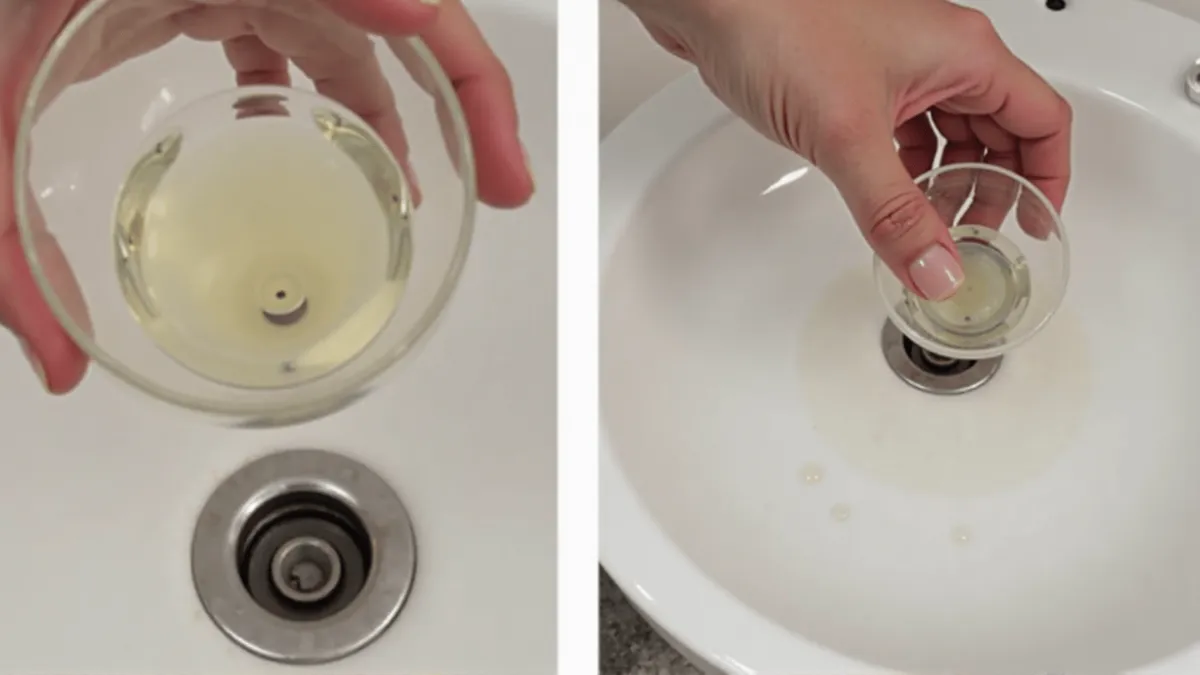Every household has faced that moment: water swirling lazily around your ankles in the shower, a kitchen sink gurgling in protest, or a drain that smells faintly like last week’s leftovers. Our instincts push us toward the classic duo vinegar and baking soda because the internet insists it’s the miracle cure. But plumbers quietly agree on something surprising: that fizzy show does almost nothing for deep clogs.
There is, however, a different trick one that uses a half glass of something most people already have. It doesn’t foam. It doesn’t bubble dramatically. It simply works, because it targets the real cause of slow drains: greasy buildup that sticks to pipe walls like glue.
This method comes from an old hotel maintenance worker who swore by it for decades. “Guests see bubbles,” he said once, “but drains respond to weight, heat, and slip.” That phrase turned into a ritual millions of homeowners could use today.
The trick: half a glass of hot, salted dish soap solution
Forget the vinegar volcano. The simple trick involves mixing half a glass of thick dish soap with very hot water and slowly pouring it down the clogged drain. Dish soap is engineered to break down grease its entire purpose is to lift fats, oils, and sticky residue from surfaces. When combined with heat, it slides along pipes, dissolving the grime that hair, food scraps, and soap scum cling to.
Grease is the real villain behind most drain issues. It cools, hardens, and forms a sticky base layer. Once that layer exists, everything else hair, crumbs, lint sticks to it. Dish soap doesn’t fight the little pieces; it eliminates the glue that holds them together.
And the results feel almost like cheating.
Why this works better than fizzing methods
Vinegar and baking soda make a satisfying reaction, but that fizz only happens at the very top of the drain. The pressure is weak, and nothing significant reaches deeper buildup. You get a show, not a solution.
The half-glass trick works because:
It melts grease
It smooths the pipe walls
It breaks surface tension so blockages slide
It penetrates deeper than fizzy foam
Plumbers say warm dish soap acts like “liquid thread” through clogged zones.
The solution won’t damage pipes, doesn’t require chemicals, and is safe for septic systems. It’s the kind of quiet science we overlook in favor of dramatic bubbles.
How to do it step-by-step
Heat water until steaming (not boiling).
Mix half a glass of thick dish soap into it until it becomes creamy.
Pour the mixture slowly down the drain.
Wait 10 minutes; let gravity and heat do the work.
Rinse once with another cup of hot water.
In stubborn clogs, repeat twice.
For hair-heavy drains, follow with a quick pass of a plastic drain snake after the soap dissolves the grease layer.
Most homeowners notice the improvement instantly the water drops faster, the swirl disappears, the drain smells cleaner.
Why it belongs in your weekly routine
You don’t need a clog to use this trick. A simple half-glass treatment once a week prevents buildup entirely. Kitchen sinks stay fresh despite oil-heavy cooking, and bathroom drains stay smooth even in houses with long, thick hair.
It’s cheap, safe, and embarrassingly easy.
The bigger truth: drains don’t need drama, they need maintenance
The reason this trick works so well is simple: drains fail slowly. Buildup doesn’t happen overnight; it layers quietly. The half-glass trick interrupts that layering before it becomes a problem. You don’t need harsh chemicals. You don’t need to take pipes apart. You just need consistency.
Your drains don’t want fireworks they want a warm, slippery shortcut back to normal.
Point clé | Détail | Intérêt pour le lecteur
Hot dish soap solution | Breaks down grease and sticky buildup | Clears clogs naturally and safely
No reaction needed | Works deeper than vinegar + baking soda | Avoids ineffective home remedies
Weekly routine | Prevents future slow drains | Saves money on plumbers and chemicals
FAQ
Can I use any dish soap?
Yes, but thicker soaps (blue Dawn, concentrated formulas) work best.
Is this safe for old pipes?
Yes. It is gentler than chemical drain cleaners.
Can I do this in the shower drain?
Absolutely it works especially well on hair-related clogs.
How often should I repeat it?
Weekly for prevention; 2–3 times for an active clog.
Does boiling water work better?
No. It can warp PVC pipes. Use very hot but not boiling water.





